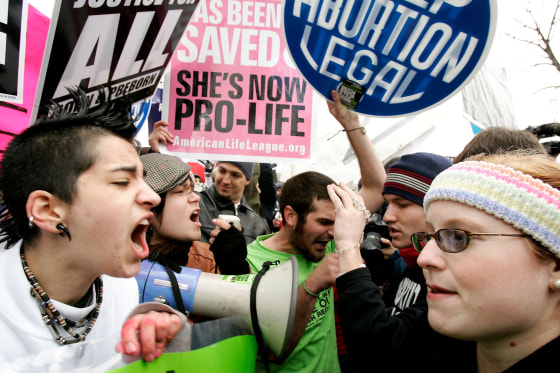Abortions don’t cause depression, although women who have depression and anxiety may be more likely to have abortions, researchers reported Wednesday.
The study is the latest to show no evidence that abortion causes depression. Policies that cite damage to mental health as a reason to restrict access to abortion are not based in fact, the researchers wrote in the Journal of the American Medical Association’s JAMA Psychiatry.
“The repercussions of abortion for mental health have been used to justify state policies that limit access to abortion in the United States,” the team, led by Dr. Julia Steinberg of the Department of Family Science at the University of Maryland, wrote.
It’s a difficult thing to study, as no researchers could ethically randomly assign pregnant women to either have an abortion or not have one. The next best thing is to study a large group of women, some of whom became pregnant and some not, and some who had abortions and others who did not.
They used Denmark’s large national database covering nearly 400,000 women born after 1980.
Steinberg’s team compared women who filled prescriptions for antidepressants to women who did not. The Danish database also carries details of abortions — something that may less accurately show up in U.S. data, where abortions may or may not be recorded.
“Compared with women who did not have an abortion, those who had an abortion had a higher rate of antidepressant use,” the researchers wrote. “A close look at the data, however, suggests that the higher rates of antidepressant use had less to do with having an abortion than with other risk factors for depression among women who had an abortion.”
“That is, the increased risk of depression did not change from the year before to the year after an abortion. And contrary to previous claims that abortion has long-term adverse effects, the risk of depression decreased as more time elapsed after the abortion,” they added.
Women who had babies had an initially lower rate of antidepressant use — perhaps because of a reluctance to take any medications while breastfeeding and caring for a newborn. But then rates of antidepressant use went up more among women who had children than among those who did not.
The findings should not surprise anyone who has looked at medical studies of abortion rates, said Dr. Nada Stotland of Rush University and Dr. Angela Shrestha of the University of Illinois at Chicago.
“Despite decades of studies showing that abortion does not cause mental illness, misinformation abounds,” they wrote in a commentary.
Some anti-abortion-rights groups claim that psychiatrists have a diagnosis called "post-abortion syndrome" or "post-abortion stress syndrome", although no such diagnosis exists in medical texts.
Women who are already in stressful circumstances may choose abortions because they cannot cope with pregnancy and child rearing, Stotland, a former president of the American Psychiatric Association and Shrestha, a psychiatry resident, wrote.
Nearly a third of U.S. women have an abortion by the age of 45, they noted.
“They have abortions for reasons: ongoing mental illness, including alcohol and substance use disorders; current obligations; intimate partner violence, including coerced or forced sex; immaturity; poverty; the need to complete an education; and insufficient social support,” they wrote.
Plus, the language around stress, anxiety and mental health is unclear.
“The English language lends itself to a confusion between mental illnesses, such as mood and anxiety disorders, with normal human experiences, such as sadness and anxiety,” they wrote.
“This confusion has been exploited by antiabortion activists both in scientific publications and in public policy.”
Anti-abortion-rights activists have misstated other medical facts to justify limiting access to abortion, including the often-debunked claim that abortion raises the risk of breast cancer. That includes a brief incident under the presidency of George W. Bush when federal agencies under the Health and Human Services Department made the false claim in brochures.



